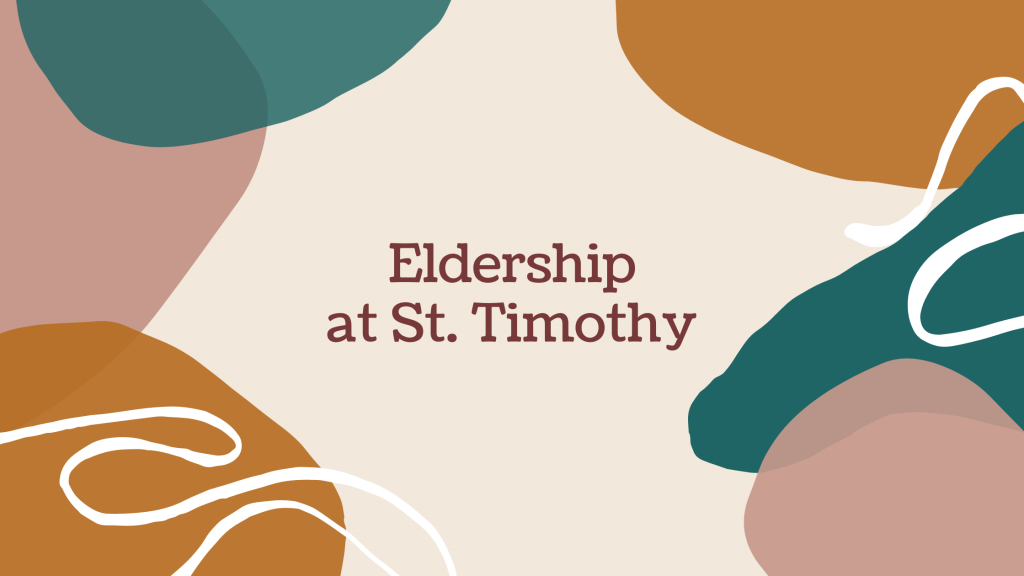
This primer explains what an elder is, and why we have elders. Much of this material is taken from “Becoming an Elder in the PCC” – a document produced by the Presbyterian Church in Canada.
Why do churches have elders?
The Presbyterian Church in Canada believes that having elders is faithful to the way the apostles of the New Testament organized the early churches. The word “Presbyterian” comes from the Greek word presbuteros meaning “elder.” We are ruled by elders.
Elders formed part of the life of the New Testament church. Most Christian converts were Jews who were already familiar with the role of elder in their own synagogues.
The early references in the New Testament describe elders as assisting church ministers: “Paul and Barnabas appointed elders for them in each church and, with prayer and fasting, committed them to the Lord in whom they had put their trust” (Acts 14:23). See also Acts 11:30 and 15:22. However, the early church was a church that was in transition; later references (as in Titus 1:4-9 and 1 Peter 5:7) imply that elders were the ministers.
From a scriptural point of view, in the early Christian church, the elders were the church leaders who met, thought and reasoned together with the apostles. Together they led and guided the church. During the Reformation, the office of the elder was given a key role, becoming the basis for the Presbyterian form of government.
The tradition of elder in our church today underlines an important principle: The Presbyterian Church in Canada gives its members significant participation in decision making, recognizing that the entire church is the people of God. The church attempts to seek God’s will through the collective decisions made by God’s people.
An Elder is “Ordained”
An elder is ordained as an elder of The Presbyterian Church in Canada and not just as an elder of your own congregation. An elder is ordained by the laying of hands of the minister and other elders. Through the laying of hands, elders are blessed with the power of the Holy Spirit and sent out to fulfill their task. An elder is ordained for life.
Active elders are part of a body called the “Session”. At our church, elders serve a fixed term on the Session. After that, they are no longer part of the Session, but are still ordained elders.
An Ordained Elder Seeks the Will of God and Guides the Church according to Biblical doctrine
That is a simple description of what an Elder does. In the next installment, we will explore in more detail what an elder does.
Through the office of ruling elder
men and women are ordained
to share with the minister
in the leadership, pastoral care,
and oversight of the congregation.
Living Faith 7.2.4
Eldership is a Calling
Eldership is a calling. It is a calling that is discerned by two parties: the individual and the congregation. It is a solemn calling, full of meaning and purpose. Discerning God’s call always involves praying to God for guidance; sometimes it is helpful to read Bible passages, particularly about call or discipleship.
Everyone experiences God’s call and the discernment process differently.
How does one discern whether to say “Yes” or “No” to an invitation to be an elder?
- Learn about the role and responsibilities of an elder
- Consider whether you feel a tugging and a burden to serve the community.
- Discuss the responsibilities of being an elder with close family members and friends, with your own and other elders, your minister and other church leaders.
- Consider if your community is confirming your sense of call. Talk and listen to God; in prayer, ask for God’s guidance.
We are called to work out the
meaning of our own lives
and to find our true vocation
in the love and service of God.
We serve and love God
by the service and love of creation
especially the care of the needy.
Every kind of work
that is honest and serves others
is a vocation from the Lord.
Calling means the necessity
to deny selfish ambition and desire
in order to minister to others.
In God’s service true freedom
is to be found.
Living Faith, 2.3
Our Role
Eldership, then, is a responsibility for all of us – those discerning a call and those discerning who is to be called.
Are you feeling a tug to possibly serve the church as an elder? Listen to this voice in prayer and take some of the steps listed above.
Do you not yet feel a personal call to eldership? Then prayerfully ask God to guide you in discerning who might be called to serve the church as an elder. If you feel a voice compelling you as to who might be fit to serve, then feel free to approach the individual and/or ministers and elders.
Let us pray that God call and raise up leaders to serve our church as elders.

Dear Simon,
thank you for your very concise and helpful descriptions of Eldership in the church. It has been useful as we seek new leadership at Mill Woods Presbyterian, Edmonton.
The grace and peace of Christ be with you.
Hi William,
Thank you for your nice words, I’m happy this post has helped. Blessings upon your church as you seek new leadership, may God provide!